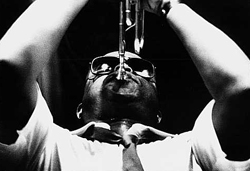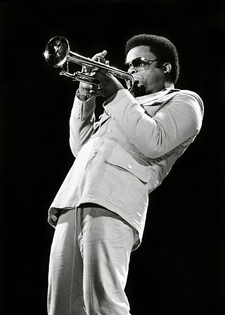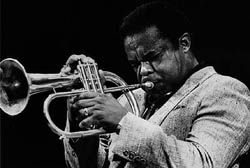 Frederick Dewayne Hubbard was born April 7, 1938 and died December 29, 2008. He was an American jazz trumpeter and was known primarily for playing in the bebop, hard bop and post bop styles from the early 60s and on. His unmistakable and influential tone contributed to new perspectives for modern jazz and bebop. Hubbard started playing the mellophone and trumpet in his school band, studying at the Jordan Conservatory with the principal trumpeter of the Indianapolis Symphony Orchestra. In his teens, Hubbard worked locally with brothers Wes and Monk Montgomery and with bassist Larry Ridley and saxophonist James Spaulding. In 1958, at the age of 22, he moved to New York, and began playing with some of the best jazz players of the era, including Philly Joe Jones, Sonny Rollins, Slide Hampton, Eric Dolphy, J. J. Johnson, and Quincy Jones. In June 1960, Hubbard made his first record as a leader, Open Sesame, with saxophonist Tina Brooks, pianist McCoy Tyner, bassist Sam Jones, and drummer Clifford Jarvis. In December 1960, Hubbard was invited to play on Ornette Coleman’s Free Jazz after Coleman had heard him playing with Don Cherry.
Frederick Dewayne Hubbard was born April 7, 1938 and died December 29, 2008. He was an American jazz trumpeter and was known primarily for playing in the bebop, hard bop and post bop styles from the early 60s and on. His unmistakable and influential tone contributed to new perspectives for modern jazz and bebop. Hubbard started playing the mellophone and trumpet in his school band, studying at the Jordan Conservatory with the principal trumpeter of the Indianapolis Symphony Orchestra. In his teens, Hubbard worked locally with brothers Wes and Monk Montgomery and with bassist Larry Ridley and saxophonist James Spaulding. In 1958, at the age of 22, he moved to New York, and began playing with some of the best jazz players of the era, including Philly Joe Jones, Sonny Rollins, Slide Hampton, Eric Dolphy, J. J. Johnson, and Quincy Jones. In June 1960, Hubbard made his first record as a leader, Open Sesame, with saxophonist Tina Brooks, pianist McCoy Tyner, bassist Sam Jones, and drummer Clifford Jarvis. In December 1960, Hubbard was invited to play on Ornette Coleman’s Free Jazz after Coleman had heard him playing with Don Cherry.
In May 1961, Hubbard played on Olé Coltrane, John Coltrane’s final recording session with Atlantic Records. Together with Eric Dolphy, Hubbard was the only ‘session’ musician who appeared on both Olé and Africa/Brass, Coltrane’s first album with ABC/Impulse! Later, in August 1961, Hubbard made one of his most famous records, Ready for Freddie, which was also his first collaboration with saxophonist Wayne Shorter. Hubbard joined Shorter later in 1961 when he replaced Lee Morgan in Art Blakey’s Jazz Messengers. He played on several Blakey recordings, including Caravan, Ugetsu, Mosaic, and Free For All. Hubbard remained with Blakey until 1966, leaving to form the first of several small groups of his own, which featured, among others, pianist Kenny Barron and drummer Louis Hayes.
It was during this time that he began to develop his own sound, distancing himself from the early influences of Clifford Brown and Morgan, and won the Downbeat jazz magazine “New Star” award on trumpet. Throughout the 1960s Hubbard played as a sideman on some of the most important albums from that era, including, Oliver Nelson’s The Blues and the Abstract Truth, Eric Dolphy’s Out to Lunch, Herbie Hancock’s Maiden Voyage, and Wayne Shorter’s Speak No Evil. He recorded extensively for Blue Note Records in the 1960s; eight albums as a bandleader, and twenty-eight as a sideman. Hubbard was described as “the most brilliant trumpeter of a generation of musicians who stand with one foot in ‘tonal’ jazz and the other in the atonal camp”. Though he never fully embraced the free jazz of the ’60s, he appeared on two of its landmark albums, Coleman’s Free Jazz and Coltrane’s Ascension.
 Hubbard achieved his greatest popular success in the 1970s with a series of albums for Creed Taylor and his record label CTI Records, overshadowing Stanley Turrentine, Hubert Laws, and George Benson. Although his early 1970s jazz albums Red Clay, First Light, Straight Life, and Sky Dive were particularly well received and considered among his best work, the albums he recorded later in the decade were attacked by critics for their commercialism. First Light won a 1972 Grammy Award and included pianists Herbie Hancock and Richard Wyands, guitarists Eric Gale and George Benson, bassist Ron Carter, drummer Jack DeJohnette, and percussionist Airto Moreira. In 1994, Freddie, collaborating with Chicago jazz vocalist/co-writer Catherine Whitney, had lyrics set to the music of First Light.
Hubbard achieved his greatest popular success in the 1970s with a series of albums for Creed Taylor and his record label CTI Records, overshadowing Stanley Turrentine, Hubert Laws, and George Benson. Although his early 1970s jazz albums Red Clay, First Light, Straight Life, and Sky Dive were particularly well received and considered among his best work, the albums he recorded later in the decade were attacked by critics for their commercialism. First Light won a 1972 Grammy Award and included pianists Herbie Hancock and Richard Wyands, guitarists Eric Gale and George Benson, bassist Ron Carter, drummer Jack DeJohnette, and percussionist Airto Moreira. In 1994, Freddie, collaborating with Chicago jazz vocalist/co-writer Catherine Whitney, had lyrics set to the music of First Light.
Following a long setback of health problems and a serious lip injury in 1992, Hubbard was again playing and recording occasionally, even if not at the high level that he set for himself during his earlier career. His best records ranked with the finest in his field. In 2006, The National Endowment for the Arts honored Hubbard with its highest honor in jazz, the NEA Jazz Masters Award.
On December 29, 2008, Hubbard’s hometown newspaper, The Indianapolis Star reported that Hubbard died from complications from a heart attack suffered on November 26 of the same year. Billboard magazine reported that Hubbard died in Sherman Oaks, California.
 You can now stream WNCU via your iPhone!
You can now stream WNCU via your iPhone!

 Frederick Dewayne Hubbard was born April 7, 1938 and died December 29, 2008. He was an American jazz trumpeter and was known primarily for playing in the bebop, hard bop and post bop styles from the early 60s and on. His unmistakable and influential tone contributed to new perspectives for modern jazz and bebop. Hubbard started playing the mellophone and trumpet in his school band, studying at the Jordan Conservatory with the principal trumpeter of the Indianapolis Symphony Orchestra. In his teens, Hubbard worked locally with brothers Wes and Monk Montgomery and with bassist Larry Ridley and saxophonist James Spaulding. In 1958, at the age of 22, he moved to New York, and began playing with some of the best jazz players of the era, including Philly Joe Jones, Sonny Rollins, Slide Hampton, Eric Dolphy, J. J. Johnson, and Quincy Jones. In June 1960, Hubbard made his first record as a leader, Open Sesame, with saxophonist Tina Brooks, pianist McCoy Tyner, bassist Sam Jones, and drummer Clifford Jarvis. In December 1960, Hubbard was invited to play on Ornette Coleman’s Free Jazz after Coleman had heard him playing with Don Cherry.
Frederick Dewayne Hubbard was born April 7, 1938 and died December 29, 2008. He was an American jazz trumpeter and was known primarily for playing in the bebop, hard bop and post bop styles from the early 60s and on. His unmistakable and influential tone contributed to new perspectives for modern jazz and bebop. Hubbard started playing the mellophone and trumpet in his school band, studying at the Jordan Conservatory with the principal trumpeter of the Indianapolis Symphony Orchestra. In his teens, Hubbard worked locally with brothers Wes and Monk Montgomery and with bassist Larry Ridley and saxophonist James Spaulding. In 1958, at the age of 22, he moved to New York, and began playing with some of the best jazz players of the era, including Philly Joe Jones, Sonny Rollins, Slide Hampton, Eric Dolphy, J. J. Johnson, and Quincy Jones. In June 1960, Hubbard made his first record as a leader, Open Sesame, with saxophonist Tina Brooks, pianist McCoy Tyner, bassist Sam Jones, and drummer Clifford Jarvis. In December 1960, Hubbard was invited to play on Ornette Coleman’s Free Jazz after Coleman had heard him playing with Don Cherry.
 Hubbard achieved his greatest popular success in the 1970s with a series of albums for Creed Taylor and his record label CTI Records, overshadowing Stanley Turrentine, Hubert Laws, and George Benson. Although his early 1970s jazz albums Red Clay, First Light, Straight Life, and Sky Dive were particularly well received and considered among his best work, the albums he recorded later in the decade were attacked by critics for their commercialism. First Light won a 1972 Grammy Award and included pianists Herbie Hancock and Richard Wyands, guitarists Eric Gale and George Benson, bassist Ron Carter, drummer Jack DeJohnette, and percussionist Airto Moreira. In 1994, Freddie, collaborating with Chicago jazz vocalist/co-writer Catherine Whitney, had lyrics set to the music of First Light.
Hubbard achieved his greatest popular success in the 1970s with a series of albums for Creed Taylor and his record label CTI Records, overshadowing Stanley Turrentine, Hubert Laws, and George Benson. Although his early 1970s jazz albums Red Clay, First Light, Straight Life, and Sky Dive were particularly well received and considered among his best work, the albums he recorded later in the decade were attacked by critics for their commercialism. First Light won a 1972 Grammy Award and included pianists Herbie Hancock and Richard Wyands, guitarists Eric Gale and George Benson, bassist Ron Carter, drummer Jack DeJohnette, and percussionist Airto Moreira. In 1994, Freddie, collaborating with Chicago jazz vocalist/co-writer Catherine Whitney, had lyrics set to the music of First Light.